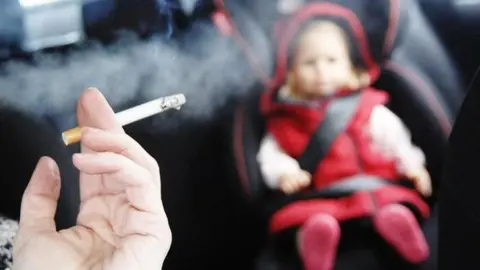Smoking: Thousands quit as ban extension proposed
 Getty Images
Getty ImagesAbout 33,000 people in Wales have stopped smoking since the coronavirus pandemic began, a survey by charity Action on Smoking and Health suggests.
The figures are extrapolated from a UK-wide survey of over 10,000 people between April and June 2020.
The news comes after the Welsh health minister suggested town centres could in future become smoke-free zones.
Extensions to existing laws will see smoking banned in playgrounds, and in hospital and school grounds.
The UK-wide survey by Ash in conjunction with YouGov suggested over one million people have quit smoking since April, with 41% saying it was as a result of coronavirus.
What are the rules on smoking in Wales?
Legislation under the Public Health (Wales) Act is being brought in to prevent people lighting up in children's playgrounds, outside hospital buildings and in the grounds of schools.
Smoking inside workplaces and public buildings has been banned in Wales since 2007, and in cars carrying children since October 2015.
But last month, Health Minister Vaughan Gething indicated he wanted to go further and extend the ban to outdoor areas of cafes and restaurants, as well as city and town centres, if Labour remains in government.
He said: "We have begun the process of setting our priorities for post-2020 to further reduce smoking rates to achieve our aim of a smoke-free Wales and I remain committed to making more of Wales' public spaces smoke-free."
According to research by Ash Wales, 63% of adults support a ban in outdoor food seating areas and 59% support a town centre ban.
At present, 17% of adults in Wales smoke.
Suzanne Cass, chief executive of Ash Wales, said: "What we've seen during the pandemic is a year's worth of quitting figures in just four months.
"We know that smokers are at significantly higher risk from the Covid-19 virus, and we welcome the news that so many are quitting as a result."
Speaking about the potential for making outdoor spaces smoke-free, Ms Cass said: "As lockdown restrictions are lifted and customers, including families with young children, return to the outdoor areas of pubs, cafes and restaurants, it is more important than ever to ensure that staff and customers are protected from breathing in second hand smoke which we know carries significant health risks."
 PA
PAKeir Lewis, respiratory medicine professor at Swansea University, said there was a theoretical increased risk of smokers passing on coronavirus.
"They cough more often and when people cough, we know the droplets spread further than two metres.
"There is also the risk that those exposed to second-hand smoke are more likely to cough and spread any of their droplets further," he said.
Simon Clark, director of the smokers' group Forest, said: "Thanks to the coronavirus crisis, the hospitality sector faces a huge challenge to get back on its feet.
"Further regulations could discourage a lot of customers from returning if they can't smoke outside."
